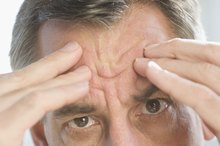What does fact checked mean?
At Healthfully, we strive to deliver objective content that is accurate and up-to-date. Our team periodically reviews articles in order to ensure content quality. The sources cited below consist of evidence from peer-reviewed journals, prominent medical organizations, academic associations, and government data.
The information contained on this site is for informational purposes only, and should not be used as a substitute for the advice of a professional health care provider. Please check with the appropriate physician regarding health questions and concerns. Although we strive to deliver accurate and up-to-date information, no guarantee to that effect is made.
Weight Loss and Feeling Thirsty
With weight loss, your body reduces the amount of body weight consisting of body fat and fluids. A reduction in fluid levels may deplete your body of water at the cellular level. This may cause feelings of thirst, indicating a degree of dehydration. Factors contributing to the feelings of thirst include type of diet, amount of weight lost and activity level.
Function
Water is a major part of your body. Water makes up 80 percent of your blood and brain and 50 percent of the rest of your body. Water helps regulate all systems and body temperature, and to lubricate joints. Water improves the appearance of your skin, eyes and hair. Nutrient transport and vitamin and mineral absorption are enhanced by water.
- Water is a major part of your body.
- Water helps regulate all systems and body temperature, and to lubricate joints.
Effects
How to Calculate How Much Water To Drink Daily
Learn More
Weight loss is based on creating a caloric deficit, when the amount of calories eaten is less than the amount of calories burned. When more calories are needed for energy, stored glycogen is converted to energy resulting in reduced body fat and body weight. Stored glycogen holds water which is released when the glycogen is converted to energy. Your body loses weight in a combined form of body fat and water. If the fluid lost is not replaced, your body experiences a level of dehydration which causes feelings of thirst.
- Weight loss is based on creating a caloric deficit, when the amount of calories eaten is less than the amount of calories burned.
- When more calories are needed for energy, stored glycogen is converted to energy resulting in reduced body fat and body weight.
Types
How weight is lost can affect levels of dehydration and thirst. Weight loss products that promote fat burning contain diuretics. Diuretics promote excess water loss resulting in a depleted condition causing thirst. High protein, low carbohydrate diets cause a condition called ketogenesis. With low carbohydrate intake, your body quickly turns to fat for burning calories. This causes a significant amount of water loss which intensifies feelings of thirst. Consuming large amounts of caffeine and alcohol causes dehydration and thirst. High intensity exercise results in excessive sweating, which depletes water levels.
- How weight is lost can affect levels of dehydration and thirst.
Significance
Sodium & Water Balance in the Body
Learn More
Thirst is a symptom of dehydration, a condition affecting up to 75 percent of Americans at any given time. Dehydration causes fatigue, problems with concentration, cramps, bloating, gas and constipation.cause:
- Dehydration causes fatigue
- problems with concentration
- cramps
- bloating
- gas
- constipation
Reduced fluid levels cause cells to draw water from your blood, resulting in thickened blood, which strains your heart.
Prevention/Solution
Suggested weight loss totals are 1 to 2 lbs. weekly. This prevents excessive water loss. Water lost through exercise needs to be replaced. Suggested water intake is between six to ten glasses per day. Avoid excessive amounts of salt in food, caffeine, alcohol and fat burning products to prevent dehydration causing thirst 2.
- Suggested weight loss totals are 1 to 2 lbs.
- Water lost through exercise needs to be replaced.
Related Articles
References
Writer Bio
Luann Voza teaches both math and science in an elementary school setting and physical education in a college setting. A former fitness-club owner, Voza has taught group fitness classes in step, aerobics, yoga, Pilates and kickboxing. As a bodybuilder, she held the title of Ms. New Jersey Lightweight Division Winner. Voza has a master's degree in exercise physiology and a doctoral degree in education.








